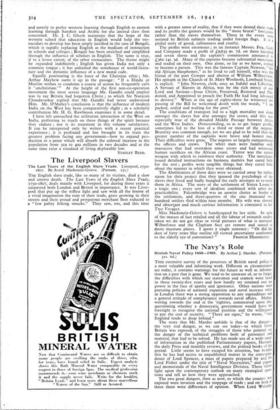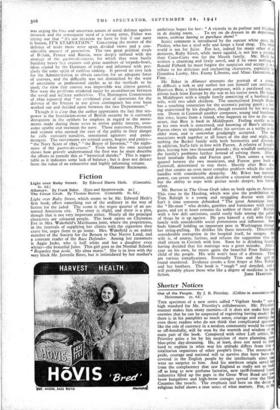The Navy's Role British Naval Policy 1880-1905. By Arthur J.
Marder. (Putnam 31s. 6d.)
THIS extensive survey of the processes of British naval policy is a most valuable and informing work. Different as circumstances are today, it contains warnings for the future as well as informa- tion on a past that is gone. We tend to be unaware of, or to forget, the difficulties with which our statesmen and seamen were faced in those twenty-five years and how hardly we retained our sea power in the face of apathy and ignorance. Other nations were pursuing policies of national expansion and naval increase while in London there was a strong opposition to any expenditure and a general attitude of complaisance towards naval affairs. Mahan, writing towards the end of the 'eighties, commented upon this, questioning whether a democratic government would have the foresight to recognise the national position and the willingness to pay the cost of security. " There are signs," he wrote, " that England tends to drop behind."
The story that Mr. Marder unfolds is that of the danger– the very real danger, as we can see today—to which Great Britain was exposed, of the struggles of those who pointed out the danger of the technical problems both of personnel and material, that had to be solved. He has made use of a wide range of information in the published Parliamentary papers, Hansard, the daily Press and monthly reviews, and the printed bOoks of the period. Little seems to have escaped his attention, but besides this he has had access to unpublished matter in the correspon- dence of Lord Spencer, a mass of papers prepared by and for Lord Fisher under the title of " Naval Necessities," and papers and memoranda of the Naval Intelligence Division. These throw light upon the contemporary outlook on many strategical ques- tions and tell us how they were approached.
The two great dangers, then as now, to which the country was, exposed were invasion and the stoppage of trade ; and on both °I these there were differences of opinion. When Lord WolseleY
was urging the frail and uncertain nature of naval defence against invasion and the consequent need of a strong army, Fisher was crying out that " it's not invasion we have to feat if our navy Is beaten, IT'S STARVATION." Concerning the matter of the defence of trade there were again divided views and a con- siderable amount of pessimism. The -two great political rivals of Britain, France and Russia, were deeply imbued with the strategy of the guerre-de-course, for which they were busily building heavy fact cruisers and great numbers of torpedo-boats, ideas copied by the Germans of today and informed with pre- cisely the same spirit of ruthless sinking. It proved no easy task for the Administration to obtain sanction for an adequate force of cruisers, and the difficulty was not diminished by the want of unanimity in professional circles as to the methods to be used; the view that convoy was impossible was almost general. Nor were the problems rendered easier by co-ordination between the naval and mi:itary authorities. The Hartington Commission of I890 reported that " no combined plan of operations for the defence of the Empire in any given contingency has ever been worked out and decided upon between the two Departments."
Though it is eear that the author appreciates the fact that sea- power is the foundation-stone of British security he is curiously derogatory in the epithets he employs in regard to the move- ments made during those years to revive public interest, over- come apathy and maintain the navy. Those statesmen, Pressmen and seamen who opened the eyes of the public to their danger he calls variously navalists, sensational agitators and panic- mongers. The movements are termed scares, bogeys and panics- " the Navy Scare of 1893," " the Bogey of Invasion," " the night- mare of the guerre-de-course." Even when his own account shows how gravely undermanned the fleet was he must describe the efforts to remedy this as " hysterical shrieks." This is regret- table as it indicates some lack of balance • but it does not detract from the value of an exhaustive and highly informing volume.
HERBERT RICHMOND.



























 Previous page
Previous page